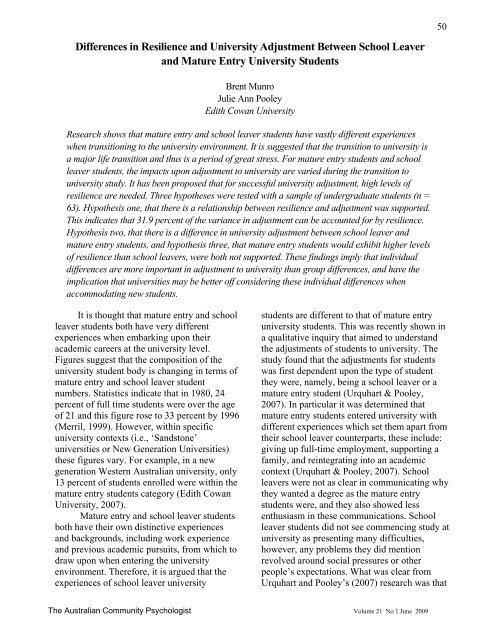issue 1 09 - APS Member Groups - Australian Psychological Society
issue 1 09 - APS Member Groups - Australian Psychological Society
issue 1 09 - APS Member Groups - Australian Psychological Society
Create successful ePaper yourself
Turn your PDF publications into a flip-book with our unique Google optimized e-Paper software.
50Differences in Resilience and University Adjustment Between School Leaverand Mature Entry University StudentsBrent MunroJulie Ann PooleyEdith Cowan UniversityResearch shows that mature entry and school leaver students have vastly different experienceswhen transitioning to the university environment. It is suggested that the transition to university isa major life transition and thus is a period of great stress. For mature entry students and schoolleaver students, the impacts upon adjustment to university are varied during the transition touniversity study. It has been proposed that for successful university adjustment, high levels ofresilience are needed. Three hypotheses were tested with a sample of undergraduate students (n =63). Hypothesis one, that there is a relationship between resilience and adjustment was supported.This indicates that 31.9 percent of the variance in adjustment can be accounted for by resilience.Hypothesis two, that there is a difference in university adjustment between school leaver andmature entry students, and hypothesis three, that mature entry students would exhibit higher levelsof resilience than school leavers, were both not supported. These findings imply that individualdifferences are more important in adjustment to university than group differences, and have theimplication that universities may be better off considering these individual differences whenaccommodating new students.It is thought that mature entry and schoolleaver students both have very differentexperiences when embarking upon theiracademic careers at the university level.Figures suggest that the composition of theuniversity student body is changing in terms ofmature entry and school leaver studentnumbers. Statistics indicate that in 1980, 24percent of full time students were over the ageof 21 and this figure rose to 33 percent by 1996(Merril, 1999). However, within specificuniversity contexts (i.e., ‘Sandstone’universities or New Generation Universities)these figures vary. For example, in a newgeneration Western <strong>Australian</strong> university, only13 percent of students enrolled were within themature entry students category (Edith CowanUniversity, 2007).Mature entry and school leaver studentsboth have their own distinctive experiencesand backgrounds, including work experienceand previous academic pursuits, from which todraw upon when entering the universityenvironment. Therefore, it is argued that theexperiences of school leaver universitystudents are different to that of mature entryuniversity students. This was recently shown ina qualitative inquiry that aimed to understandthe adjustments of students to university. Thestudy found that the adjustments for studentswas first dependent upon the type of studentthey were, namely, being a school leaver or amature entry student (Urquhart & Pooley,2007). In particular it was determined thatmature entry students entered university withdifferent experiences which set them apart fromtheir school leaver counterparts, these include:giving up full-time employment, supporting afamily, and reintegrating into an academiccontext (Urquhart & Pooley, 2007). Schoolleavers were not as clear in communicating whythey wanted a degree as the mature entrystudents were, and they also showed lessenthusiasm in these communications. Schoolleaver students did not see commencing study atuniversity as presenting many difficulties,however, any problems they did mentionrevolved around social pressures or otherpeople’s expectations. What was clear fromUrquhart and Pooley’s (2007) research was thatThe <strong>Australian</strong> Community Psychologist Volume 21 No 1 June 20<strong>09</strong>
















